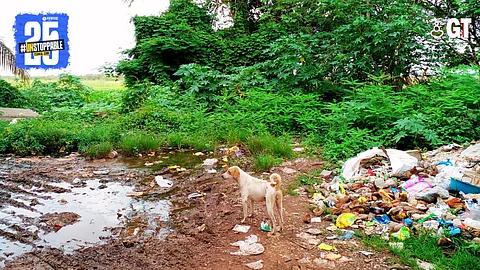

If a poll were to be conducted, asking Goans about the most urgent issues facing the State today, garbage would undoubtedly be among the top three responses. The evidence is all around us — garbage littering beaches, highways, rivers and streams. It's a major factor damaging Goa’s reputation on the global tourism map.
Goa produces around 800 tonnes of waste each day, and this number keeps growing. What's more concerning is the rising consumption of single-use and non-recyclable plastics.
BEHIND THE PROBLEM
Waste management experts say that single-use plastic consumption has increased since the Covid-19 pandemic, mainly due to the boom in home deliveries. Nearly everything ordered online arrives packaged in layers of plastic and paper, adding to the mounting waste.
And, it's not just the locals or residents who contribute to Goa's waste problem. Being a major tourist destination, Goa attracts hundreds of thousands of visitors each season, contributing significantly to its waste problem.
Popular spots like beaches, waterfalls and forests are frequently littered with discarded alcohol bottles, water containers and food packaging discarded by tourists. This alarming sight highlights a growing issue with seemingly no solution in sight.
But, there is a solution to these issues, and it’s quite simple: we need to be mindful of our resources and think twice before disposing of anything. By following a few simple steps individually and as a community, positive change is possible.
WHAT WE CAN DO
The first and most important step in waste management is segregating waste into biodegradable and non-biodegradable categories. Home composting, using composters or community composting units — now mandatory in many housing complexes — is an effective way to manage biodegradable waste.
If your complex doesn’t have one, residents should take the initiative to set up a unit. This can reduce waste by up to 60% and provide nutrient-rich manure for your garden.
The next step involves managing dry or non-biodegradable waste, which includes plastics, paper, glass, metal and more. This waste should be sorted at the source, and then, delivered to Material Recovery Facilities (MRFs) located across Goa, where these materials are collected and processed.
It’s important to ensure that the items — especially food-related plastics — are clean and properly segregated before disposal.
If you’re a tourist visiting Goa, do avoid littering in public spaces. Use the dustbins provided, especially on beaches where they are usually available.
If you don’t find a dustbin nearby, carry your wrappers or bottles or other trash back with you until you can dispose of them properly at a dustbin or restaurant or at your hotel.
Make it a habit not to litter — keeping our surroundings clean is everyone’s responsibility.
If you’re more environmentally conscious, always carry your own water bottle while travelling — water filters are now available at airports, railway stations and other public places. Bringing your own spoon, straw and cup can also help reduce single-use waste.
All this may seem challenging at first, but knowing how much plastic you’ve prevented from being generated will keep you motivated
In addition to these steps, we should support individuals and organisations promoting sustainable lifestyles, such as Sensible Earth (in Salvador do Mundo, Bardez), which offers cloth bags made from recycled fabrics, and shops like Zero Posro that encourage local, plastic-free groceries.
While individual efforts are vital, authorities must also focus on cleaning public spaces and enforcing strict fines for littering. Combating Goa’s waste problem requires both responsible citizens as well as proactive government action.